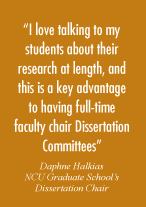



In the spirit of our mission, educating professionals throughout the world and providing an accessible opportunity to earn a U.S. regionally accredited degree; VERITAS proudly welcomes The Graduate School’s newest Full-Time Dissertation Chair, Daphne Halkias, PhD, now living in the exotic locale of Abu Dhabi, UAE!
"We are delighted that Dr. Halkias has decided to join our team. She is a decidedly accomplished research authority with a vast amount of both academic and applied experience. We look forward to Dr. Halkias sharing her high levels of knowledge, insight, and experience with our doctoral candidates," notes Gregory T. Bradley, Ph.D., Dean of The Graduate School.
11 hours ahead of us here in Scottsdale, AZ., we recently touched base with Dr. Halkias.
Welcome aboard! Your resume is the stuff of legends with professional positions and affiliations with Cornell, Harvard Medical School, Oxford, and Cambridge! What drew you to Northcentral University?
While I maintain scholarly affiliations on research projects with these universities, my primary focus nowadays is mentoring dissertation students as a Full-Time Dissertation Chair at NCU. The past several years my husband and I have lived abroad due to professional appointments - before Abu Dhabi, we lived in Athens, Greece, and during those years I was a Visiting Professor and Organizational Consultant in Paris, France, Beirut, Lebanon and Milan, Italy. Last year we moved to Abu Dhabi, a wonderful city with a rich heritage and culture (and here, like Arizona, it’s summer every day!), where my husband is an Associate Dean of Business and Technology at one of the local public polytechnic universities. One day he mentioned to me that the Director of his school’s Business Program in Fujairah (a town outside of Dubai) had just received his doctorate from an online university in the States, Northcentral University, and had conducted his dissertation research in technology here in Abu Dhabi. As a researcher, that piqued my interest in NCU. I went online and read parts of that dissertation - it was really good!
Coincidentally, at that time I was in touch with Dr. Eva Mika, Director for Curriculum at the Graduate School and we were collaborating on a new course outline for an NCU doctoral course in Case Study Research in Education - on a collegial level, not for remuneration. I had been talking to Dr. Mika that aside from my scholarly research work and publishing case study books, I missed mentoring graduate student research once we moved out here. It was then that she suggested I think about applying as a Dissertation Chair in a new academic model for dissertation mentoring Dean Greg Bradley and his team were developing at NCU’s Graduate School. And now, working with my colleagues at the graduate school, including Dr. John Fulginiti who is Director of Dissertation Management at the GS and the colleague with whom I work with most closely, I am so impressed with the team Dean Bradley has brought together. And, my fellow colleagues who serve as FT Dissertation Chairs are a joy to work with in terms of their dedication to students, commitment to the dissertation process, and high-caliber professionalism. And the story starts there!
Tell us about your new role with The Graduate School, and what can our Doctoral students expect when working with you?
I have been supervising graduate students for more than two decades in both American and international schools. All the FT Dissertation Chairs are similarly qualified as academics and scholars. You have to know and write and live research to be able to mentor doctoral students through the dissertation process. Being a Dissertation Chair is not just an academic process, but also a social process. So, I also love talking to my students about their research at length, and this is a key advantage to having full-time faculty chair Dissertation Committees - the time element. A Dissertation Chair does not just need professional skills, but rather time to interact through synchronous communication with students (Skype for me works best due to living abroad). It’s the key to engaging students and professors alike in dissertation work in an online environment. I believe Dean Bradley and NCU are truly committed to that idea through the development of the Graduate School and hiring a cadre of highly qualified FT Dissertation Chairs to mentor doctoral students. I love research, reading, learning and brainstorming with colleagues on innovative research ideas and bringing them to life through investigative inquiry. And to me, as to all the other Chairs, dissertation students are colleagues. A dissertation is the first step in doing true independent, scholarly research for any professional. I don’t see myself as talking at my dissertation students, but as working with them to accomplish a research goal.
Your Ph.D. is in Psychology, yet as a truly global citizen, your work has involved published papers and books in migration issues and policy, entrepreneurship, poverty alleviation, sustainability, international management and family counseling – to battling alcoholism, stress and eating disorders. What kind of perspective do you have about NCU and the Graduate School as someone coming from such a diverse background?
In recent years, I have published extensively in various areas of entrepreneurship. Entrepreneurship is the creative and business wave that will help the recessional economies of the developed world and bring poverty alleviation and economic and social development to the developing world. At the crest of that wave is online education - to truly make learning accessible to all corners of the world. In addition, online education can garner the best of professional minds who cannot gather in one place (Arizona), but can be reached easily through the Internet. Most of last year, we lived in a remote location in the desert. Were it not for technology, I wouldn’t be teaching nor doing research. So, online education benefits people on many levels.
The people that start online schools and universities are entrepreneurs. Entrepreneurship needs a vision and financial and social capital. But once an enterprise is established and working, what you need to keep it innovative, sustainable and contributing social value to its community is internal entrepreneurship. When I first spoke on the phone to Dean Bradley about the FT Dissertation Chair position, my immediate thought while he was describing the development of the Graduate School and his vision of how to support doctoral student success in the dissertation stage, was: “This guy is an internal entrepreneur!” After having worked the past two months at NCU’s Graduate School, I am sure that’s a fitting title for others Dean Bradley works with and for, right up to President Gardner. We tend to focus on individuals who develop a groundbreaking idea (see an online dating service rigged up by a nerdy undergraduate at Harvard), rather than on the hard currency of the idea itself (see the billion-plus strong Facebook). “Intrapreneurs” are the ones who keep businesses humming year-to-year, quarter-to-quarter. Dean Bradley and others at NCU saw the problem that existed in the former dissertation process not as a barrier, but as an opportunity, a challenge and an unmet need. He is a problem solver who has built a professional network within the GS to bring the dissertation process to a new level of both academic rigor and successful outcomes for NCU doctoral students. It’s great to be part of that team of staff and doctoral students alike working towards these goals.
What are you currently reading – or what’s a book that you would recommend?
For fiction it’s “The Sense of an Ending” by Julian Barnes. It won the Booker Prize for Fiction last year and is a short, intense, deeply moving study of a life. I recommend it highly, especially for students interested in how the working of the kind translates to a life’s narrative. It can actually be read over a long weekend.
For non-fiction, it’s Daniel Kahneman’s “Thinking, Fast and Slow.” My Behavioral Economics students know how much I love to quote Kahneman ad nauseum. He is a Nobel winner in Economic Science for, uncannily, his seminal work in psychology that challenged the rational model of judgment and decision making (after reading this book, you’ll never place a bet in Vegas again!!!). His ideas have had a profound and widely regarded impact on many fields—including economics, medicine, and politics — and in this one book he brings together his many years of research and thinking. Fascinating reading for students of all disciplines (but you’ll need months- not a weekend!).